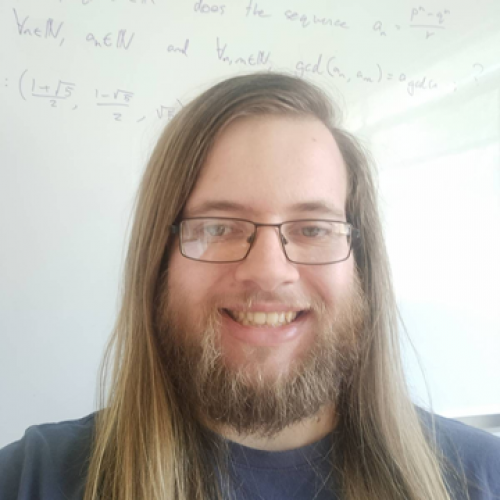
David Farrell
Macquarie University
David Farrell completed his Bachelor of Science at the University of Auckland, New Zealand majoring in mathematics, in 2017. From there he completed both an honours and masters degree at the University of Auckland, finishing in mid 2020. His masters thesis was on functional analysis and he used special functions defined on infinite-dimensional function spaces to prove facts about the topology of those spaces, and he published a paper with my supervisor Warren Moors on this in the Journal of Convex Analysis. From there David Farrell decided to study category theory, and moved to Australia and started his PhD at Macquarie University in 2021. He’s interested in really all of mathematics, and likes to study a bit of everything, but his main interests are category theory, topology and analysis.
Can you give me a quick overview of the type of mathematics you are studying and its potential impacts for the broader community ?
Mathematics is all about doing stuff. A core concept of mathematics is the concept of a function, which is something you can do. A function is an abstract process which you can “apply” – typically, it takes some type of mathematical object, such as a number, does something to it and gives back a new mathematical object – of possibly a different type. All of mathematics can be described as studying some kind of function – continuous, polynomial, computable, etc. Category theory is the step above: instead of studying one specific type of function, category theory studies types of types of functions, and the algebraic systems – called categories – that you get when considering all functions of a specific type and the ways in which they can be combined. Since these abstract systems are present in all fields of mathematics, category theory has implications for all of mathematics, and beyond – in particular has found fruitful applications in topology and computer science.
How did you get into mathematics/statistics/data science? Was there someone or something that inspired you to this field?
Like most people, I didn’t enjoy mathematics in high school. I started a degree in chemistry – which I did like in high school – and not long into it my friend showed me the book Introductory Mathematics: Algebra and Analysis by Geoff Smith. It was so unlike my prior experience with mathematics, so refreshingly concrete and captivatingly insightful. It changed my opinion on mathematics so much that I immediately switched major and have never looked back since.
You received a scholarship to attend AMSI Summer School 2022. How important was this in terms of your ability to attend, fully participate in the program and meet others studying in similar fields?
Critical! I simply would have not been able to attend without it, and I would have missed out on so much!
The purpose of Summer School is to give students an opportunity to develop their mathematical skills, meet like-minded people and network with potential employers. What was the most valuable part of the program for you? Was it the course content or the people you met? Do you have new ideas for your work/research or see it in a new light?
I signed up because one of the topics available was something I’d wanted to learn for years, but never had the chance to – fourier analysis and distribution theory. I worked in analysis during my masters and was very excited to learn a subject I had heard a lot about, but never managed to break into. To my surprise, the course didn’t just fill a gap in my knowledge but fundamentally shifted the way I think about analysis and the research I did in my masters! I felt years of confusion wash away when I started to understand fourier transforms, distributions and the perspective these concepts give on other concepts in analysis. The summer school has given me a whole new perspective on things I thought I understood, and new friends, and I’m so grateful for the opportunity to attend.
Summer School included a special Careers Day program which aims to help give students an idea of the kinds of career paths available to maths graduates in industry and private sector research areas. Were you previously aware of the types of industry opportunities available to mathematical science graduates? Would you consider working with industry? Do you feel better equipped to explore career options in the mathematical sciences after attending AMSI Summer School?
I learned about a lot of companies and career paths that I never knew existed, and I feel a lot more optimistic about my prospects in the event that I transition from academia to industry.
AMSI Summer School was held as a virtual event. What was the biggest positive from your point of view holding it in this format and/or the biggest challenge?
The biggest positive of the virtual format was definitely not catching COVID-19!
What advice would you give to someone who is considering applying for Summer School in 2023? Should they apply and why?
Don’t even think twice – apply! It’s just a great opportunity to learn and broaden your horizons.
Where do you want the mathematical sciences to take you? Where do you see yourself in five, ten years time?
I want to pursue a career in mathematics research – next step after my PhD will be a postdoc! Then I will see what opportunities are available and how far I can make it in the academic world.

